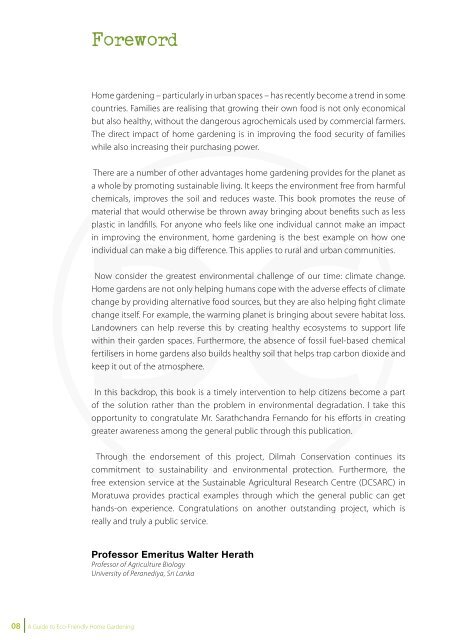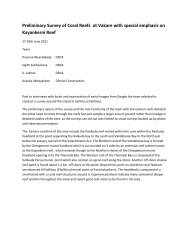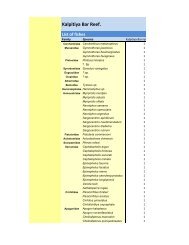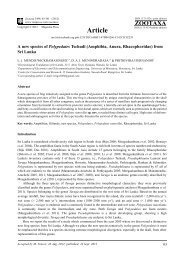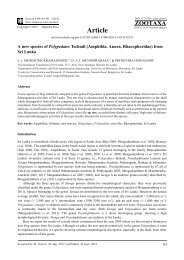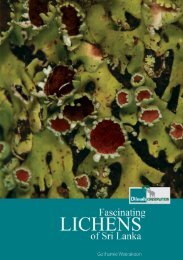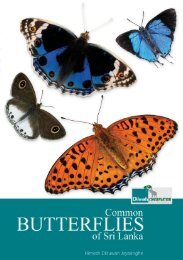A Guide to Eco-Friendly Home Gardening
A Guide to Eco-Friendly Home Gardening
A Guide to Eco-Friendly Home Gardening
Create successful ePaper yourself
Turn your PDF publications into a flip-book with our unique Google optimized e-Paper software.
Foreword<br />
Preface<br />
<strong>Home</strong> gardening – particularly in urban spaces – has recently become a trend in some<br />
countries. Families are realising that growing their own food is not only economical<br />
but also healthy, without the dangerous agrochemicals used by commercial farmers.<br />
The direct impact of home gardening is in improving the food security of families<br />
while also increasing their purchasing power.<br />
There are a number of other advantages home gardening provides for the planet as<br />
a whole by promoting sustainable living. It keeps the environment free from harmful<br />
chemicals, improves the soil and reduces waste. This book promotes the reuse of<br />
material that would otherwise be thrown away bringing about benefits such as less<br />
plastic in landfills. For anyone who feels like one individual cannot make an impact<br />
in improving the environment, home gardening is the best example on how one<br />
individual can make a big difference. This applies <strong>to</strong> rural and urban communities.<br />
Now consider the greatest environmental challenge of our time: climate change.<br />
<strong>Home</strong> gardens are not only helping humans cope with the adverse effects of climate<br />
change by providing alternative food sources, but they are also helping fight climate<br />
change itself. For example, the warming planet is bringing about severe habitat loss.<br />
Landowners can help reverse this by creating healthy ecosystems <strong>to</strong> support life<br />
within their garden spaces. Furthermore, the absence of fossil fuel-based chemical<br />
fertilisers in home gardens also builds healthy soil that helps trap carbon dioxide and<br />
keep it out of the atmosphere.<br />
In this backdrop, this book is a timely intervention <strong>to</strong> help citizens become a part<br />
of the solution rather than the problem in environmental degradation. I take this<br />
opportunity <strong>to</strong> congratulate Mr. Sarathchandra Fernando for his efforts in creating<br />
greater awareness among the general public through this publication.<br />
Through the endorsement of this project, Dilmah Conservation continues its<br />
commitment <strong>to</strong> sustainability and environmental protection. Furthermore, the<br />
free extension service at the Sustainable Agricultural Research Centre (DCSARC) in<br />
Moratuwa provides practical examples through which the general public can get<br />
hands-on experience. Congratulations on another outstanding project, which is<br />
really and truly a public service.<br />
Professor Emeritus Walter Herath<br />
Professor of Agriculture Biology<br />
University of Peranediya, Sri Lanka<br />
More communities are starting <strong>to</strong> realise the significance of home gardening <strong>to</strong>ward<br />
leading healthier lives. This traditional agricultural practice promotes healthy living<br />
through the use of available space around households <strong>to</strong> grow food. Organic<br />
gardening practices enable home gardeners <strong>to</strong> produce food within one’s own<br />
property, minus the harmful agrochemicals used in much of the produce in markets.<br />
Gardens have always been commonplace among homeowners, and gardening, in<br />
general, has long been practiced as an activity that brings about relaxation. But it is<br />
only recently that home gardening is being promoted for small spaces, even within<br />
urban communities. So, whether you live in a sprawling estate or an apartment in the<br />
city, there is always the possibility <strong>to</strong> use any available space you have <strong>to</strong> grow some<br />
healthy produce for your family.<br />
<strong>Home</strong> gardening not only enables you <strong>to</strong> produce healthy, good-tasting food, but<br />
it can also be extremely economical. In addition <strong>to</strong> these benefits, however, there<br />
are other less-talked-about benefits that have a significant positive impact on the<br />
environment.<br />
The absence of chemical pesticides, herbicides and fertilisers not only keeps us safe<br />
but also keeps the environment safe. <strong>Home</strong> gardens that are maintained by organic<br />
gardening practices also help reduce pollution. When implemented on a wide scale –<br />
home gardens undoubtedly aid in achieving food security. Furthermore, in the longterm,<br />
home-gardening practices further sustainability and, when done right, help<br />
retain biodiversity in an age when biodiversity around the world is being threatened<br />
at alarming rates. Organic cultivation also helps reduce a family’s carbon footprint,<br />
thus reducing the human influence in bringing about global warming.<br />
Dilmah Conservation embarked on this project <strong>to</strong> publish a book on eco-friendly<br />
home gardening for those who desire <strong>to</strong> reap the maximum benefits of this practice<br />
while also making their own contribution <strong>to</strong> safeguarding the environment. The<br />
publication is a part of a wider effort that also consists of the Dilmah Conservation<br />
Sustainable Agriculture Research Centre (DCSARC) that has developed proven<br />
methods in urban home gardening methods.<br />
Since this publication is aimed at promoting home gardening within small spaces,<br />
it includes a host of best practices <strong>to</strong> ensure that the home garden is successful.<br />
Concepts of vertical agriculture, organic pest control methods, sound waste<br />
management practices, water conservation and promoting biodiversity are some of<br />
the aspects that are covered in this publication.<br />
08 A <strong>Guide</strong> <strong>to</strong> <strong>Eco</strong>-<strong>Friendly</strong> <strong>Home</strong> <strong>Gardening</strong><br />
A <strong>Guide</strong> <strong>to</strong> <strong>Eco</strong>-<strong>Friendly</strong> <strong>Home</strong> <strong>Gardening</strong> 09


